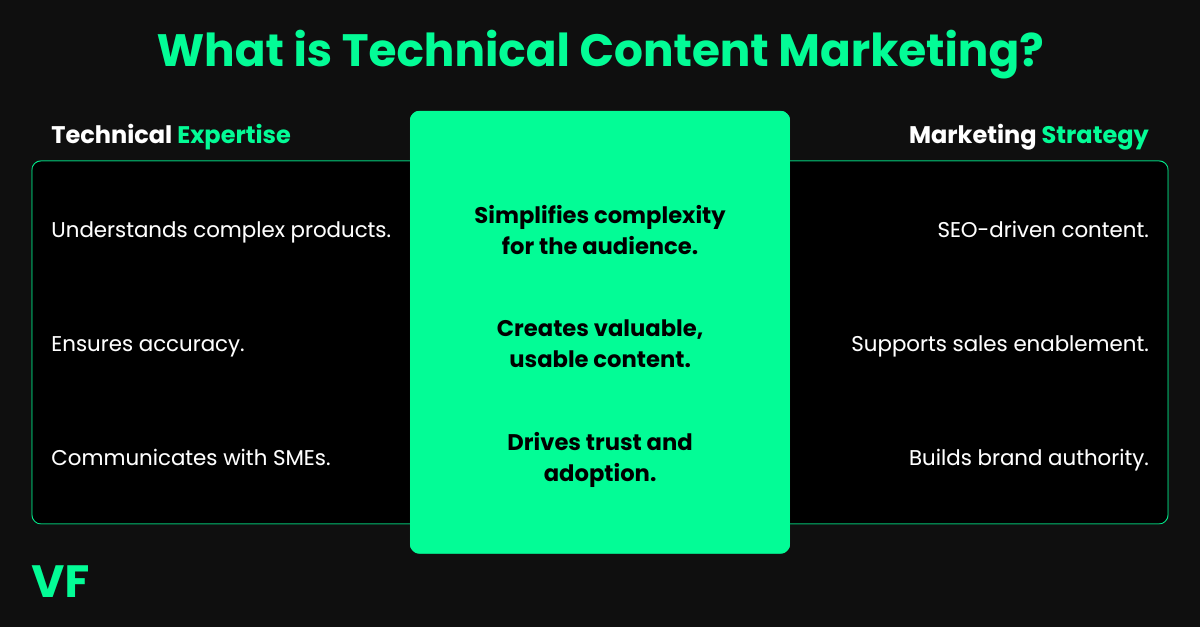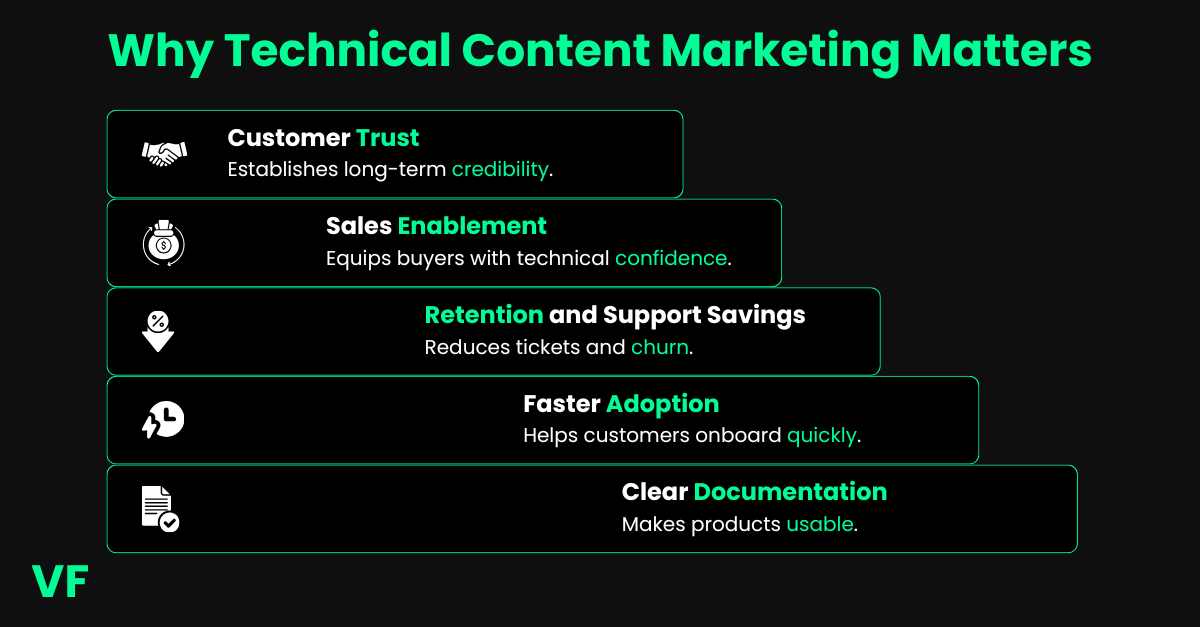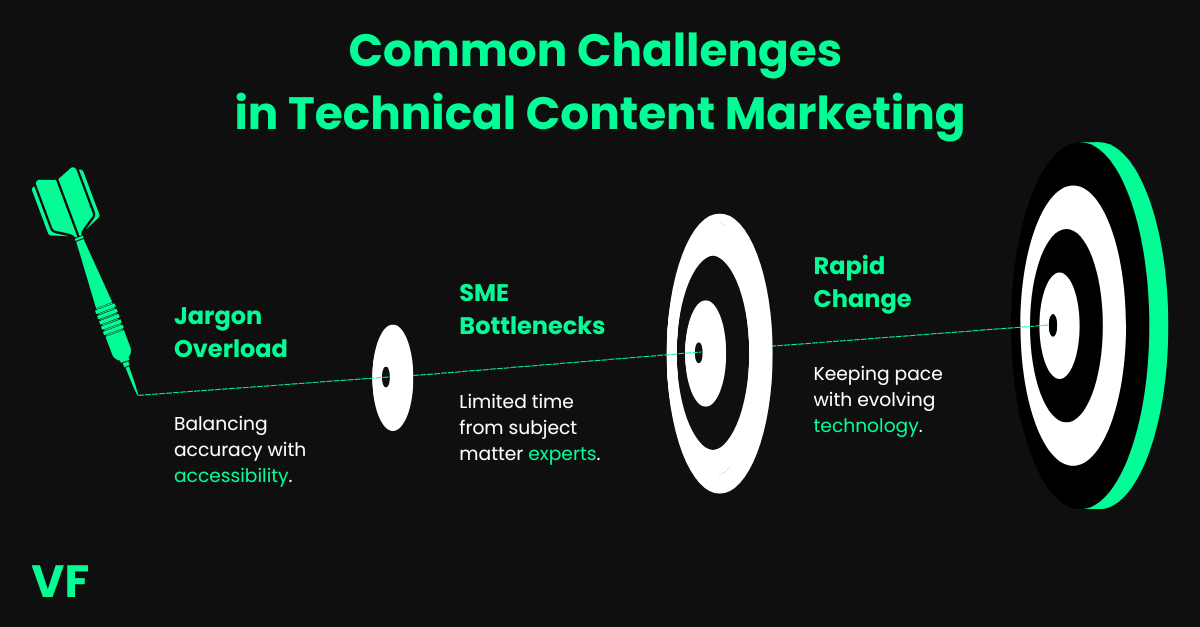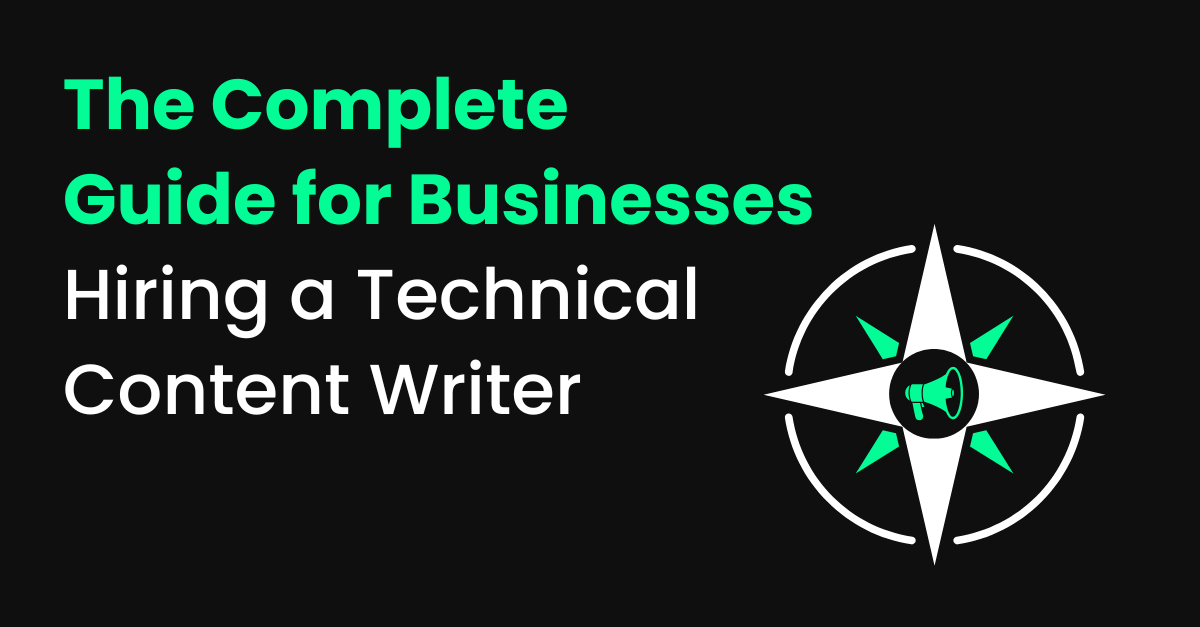Introduction
Technical content marketing is all about making complex ideas easy to understand, and in 2025, that skill is more valuable than ever. It’s not just documentation or blog posts; it’s how tech companies build trust, drive adoption, and help users succeed. Whether you’re explaining an API, writing a how-to guide, or turning developer insights into stories that sell, great technical content connects people to products in a real, human way. This guide will show you how to do it right with clarity, strategy, and a touch of creativity.
What is Technical Content Marketing?

Technical content marketing is all about turning complex information into something clear, helpful, and even enjoyable to read. It’s a blend of technical writing and content marketing where technical writers and content marketers team up to create content that educates, inspires, and supports the target audience.
The aim isn’t just to promote a product; it’s to help people understand how it works and why it matters. By creating high-quality content that explains technical products, tools, and processes, companies can build trust, drive customer success, and show real technical expertise.
Technical content marketing makes complex ideas accessible. It’s about writing content that helps real users, whether they’re developers, IT leaders, or business decision makers, achieve success with your product.
From blog posts and case studies to technical documentation and white papers, every piece of technical content serves a purpose: to teach, to guide, and to connect. When done well, it becomes a powerful tool for establishing thought leadership and helping your company stand out in competitive technical industries. How It Differs From Traditional Content Marketing
The main difference between technical content marketing and traditional content marketing lies in depth, accuracy, and audience expectations. Traditional marketing tends to focus on storytelling techniques and brand awareness, whereas technical content is laser-focused on clarity, precision, and usefulness.
Instead of just telling a story, you’re explaining how something works, breaking down complex topics so the reader can actually apply what they’ve learned. Technical audiences like developers, engineers, or product users expect content that respects their time and intelligence. They’re looking for actionable guidance, not fluff.
That’s why technical writers and marketing teams need a well-structured content strategy that balances technical expertise with a friendly, human tone.
A good technical content marketing agency or team knows how to connect with readers through helpful, accurate, and engaging educational content, the kind that builds trust and keeps customers coming back for more.
Why Technical Content Marketing Matters

Driving Adoption and Reducing Friction
When users hit a wall during onboarding, adoption stalls and so does ROI. That’s why investing in technical content marketing pays off fast. Clear documentation, well-written tutorials, and product walkthroughs enable new users to derive immediate value, thereby reducing onboarding time and support tickets.
For many companies, every extra week it takes a customer to start using a product equals lost revenue. Strong technical content addresses this issue by turning confusion into confidence.
By creating content that explains technical concepts in plain language, your team removes friction from the entire customer journey. Every guide, video, or FAQ serves as a growth lever, helping users transition from setup to success more quickly. The math is simple: faster adoption leads to shorter sales cycles and higher renewals. That’s not just good content, that’s business impact.
Strengthening Sales Enablement
In B2B technical industries, decision makers want more than marketing slogans they want proof. This is where technical content marketing shines. Technical case studies, white papers, and solution briefs provide buyers with the hard data and technical validation they need to make informed decisions. Instead of generic content marketing fluff, you’re offering depth, credibility, and practical value.
A strong content marketing strategy turns your documentation into a sales asset. By sending well-crafted technical content to potential customers, sales teams can shorten buying cycles and boost conversion rates. Simply put, every dollar invested in expert-led, high quality content returns more qualified leads, faster deals, and higher confidence from both technical and business audiences.
Retention and Customer Success
Closing a sale is great but retaining a customer is where the real ROI lives. That’s why technical content marketing is essential to long-term customer success. Self-serve content like knowledge base articles, troubleshooting guides, and tutorials empowers users to solve problems independently. This reduces support costs while improving satisfaction scores.The more accessible your technical content is, the fewer tickets your support team handles freeing up internal resources and boosting efficiency.
Even better, when customers consistently find answers in your content, they trust your brand more. Over time, your investment in clear, well-structured technical writing compounds: happier users, lower churn, and measurable business growth. In other words, technical content doesn’t just inform it drives revenue.
Challenges in Technical Content Marketing

Balancing Jargon vs. Clarity
One of the biggest challenges in technical content marketing is finding the sweet spot between precision and accessibility. When you’re creating content about highly technical products or complex topics, it’s easy to overload your readers with jargon.
But if you oversimplify, you risk losing credibility with your target audience, especially developers, engineers, or other technical audiences who value accuracy and depth. The best technical writers know how to make even the most detailed technical information approachable without watering it down.
Achieving this balance requires a thoughtful content strategy and strong technical expertise. A good technical writer or technical content marketing agency can translate technical concepts into language that resonates with both decision makers and end users.
This type of high-quality content builds trust, strengthens your brand’s thought leadership, and supports key business goals like user adoption and customer success. It’s not just about knowing the tech, it’s about knowing how to communicate it effectively.
Limited SME Bandwidth
Another major challenge for marketing teams and content marketers is the limited availability of subject matter experts (SMEs). These technical experts possess the knowledge that drives accurate and engaging technical content.
Still, they’re often too busy building, coding, or solving customer issues to dedicate time to the writing process. Without their input, creating content that truly reflects the product’s value or explains technical subjects in a way that connects with readers is challenging.
The solution is collaboration and structure. Strong content marketing strategies build efficient workflows, such as scheduled interviews, repurposing technical documentation, or using content briefs so that SMEs can contribute insights without burning hours.
When your team aligns on priorities and has a clear content calendar, you get accurate, insightful material while protecting valuable internal resources. This not only speeds up content creation but also ensures your technical content marketing needs are met with consistency and precision.
Keeping Pace with Rapid Innovation
In fast-moving technical industries, content can become outdated almost as soon as it’s published. New product features, integrations, or compliance updates can make your once-perfect white papers or case studies feel obsolete. For companies building modern technical products, this is a constant race and one that demands an agile marketing strategy.
To stay ahead, marketing teams must treat technical content as a living asset, not a one-time project. Regular updates, modular content creation, and continuous feedback loops help keep everything fresh.
By leveraging insights from users, support tickets, and analytics, you can ensure your content remains aligned with evolving customer success metrics. The ROI is clear: current, accurate content reduces confusion, drives adoption, and reinforces your company’s reputation as a thought leader. When you move fast but communicate clearly, your technical content marketing becomes not just a support function but a truly powerful tool for growth and credibility.
Strategic Role of Technical Content in the Buyer Journey

Top of Funnel (TOFU)
At the top of the funnel, technical content marketing prioritizes education over promotion. This is where companies attract awareness by creating content that answers real technical questions and solves user pain points. Instead of pushing a product, the goal is to teach, guide, and inspire. Technical writers and content marketers collaborate to simplify complex topics and explain technical concepts in clear, useful ways through SEO-driven articles, educational content, tutorials, and developer-focused blog posts.
The right content strategy helps your brand appear when your target audience is actively researching a problem. By offering high-quality content that provides genuine technical value, your brand can start to build trust early in the customer journey.
This is also where a technical content marketing agency can add real value, helping your marketing teams optimize keywords, structure, and tone so your content reaches the right readers and positions your company as a source of thought leadership and technical expertise.
Middle of Funnel (MOFU)
Once readers are aware of your brand, the middle of the funnel is where they start to evaluate and compare solutions. Here, technical content marketing becomes more strategic and data-driven.
Your marketing teams and technical writers can create in-depth content, such as case studies, product comparison guides, and white papers, that connect technical functionality to real business outcomes.
The main difference at this stage is that your technical content needs to bridge the gap between technical experts and decision makers, blending accuracy with business relevance.
A strong content marketing strategy ensures your MOFU assets show measurable ROI. By demonstrating how your technical products address specific challenges through detailed technical writing, you establish your brand as both credible and practical. The best companies use this stage to nurture leads, answer objections, and build trust, turning interest into genuine intent.
Bottom of Funnel (BOFU)
At the bottom of the funnel, technical content becomes the closer the proof that convinces prospects to buy. This is where technical documentation, compliance overviews, and in-depth case studies play a key role in validating your technical expertise. Subject matter experts and technical writers collaborate to make sure every detail is accurate, every integration is clear, and every concern from decision makers is addressed.
For technical industries, this stage often determines whether a deal is won or lost. That’s why it’s critical to deliver high-quality content that demonstrates both product reliability and customer success stories. The writing may be technical, but the message is human. We understand your problem, we’ve solved it before, and we’ll help you achieve success.
When supported by a clear marketing strategy and well-managed content calendar, your technical content marketing becomes a powerful tool that drives conversions, supports onboarding, and keeps customers engaged long after purchase.
How to Create Effective Technical Content
Working with Developers and SMEs
The best technical content starts with collaboration. Working closely with developers and subject matter experts (SMEs) ensures your writing is accurate, insightful, and practical. Instead of sending long questionnaires, sit down for short, focused interviews, ask how a feature works, why it matters, and what problems it solves for users.
This not only helps you capture authentic insights but also builds trust between marketing and technical teams. Remember, SMEs know the product inside out, but you’re the bridge that helps translate their deep knowledge into content your audience can actually use and understand.
Structuring Content for Usability
Even the most brilliant insights won’t land if your content isn’t easy to read and navigate. Great technical writing is all about structure clear headings, logical flow, and visuals that simplify complex ideas.
Use diagrams, numbered steps, and plain language to make your content feel approachable. Break down technical information into digestible chunks, and think of your layout as part of the user experience. When your readers can quickly find what they need, they’re more likely to stay engaged and actually apply what they’ve learned.
Using Customer Feedback Loops
Customer feedback is one of the most powerful tools in your content creation process. Support tickets, FAQs, and community forums are gold mines for identifying what your audience struggles with most.
Use those insights to fill knowledge gaps, refine tutorials, and update outdated documentation. By treating feedback as part of your content workflow, you create living, evolving resources that stay useful over time. Plus, your users will appreciate how your content evolves to meet their growing needs.
The Role of a Technical Writer in Content Marketing

More Than Just Words
In B2B technical content marketing, technical writers aren’t just wordsmiths they’re translators between technical experts and the target audience of developers, engineers, and business decision makers.
Their real job is to turn complex information into clear, actionable knowledge that drives adoption and reduces friction. They interview subject matter experts, analyze technical documentation, and dig into product demos to understand exactly how a technical product works then create content that explains it in plain, usable terms.
Strong technical writing focuses on helping the reader do something: configure an API, deploy a solution, or evaluate architecture options. That’s why great technical content is built around workflows, use cases, and practical examples, not marketing fluff.
In a B2B setting, this clarity can directly affect conversions if your users can’t understand your product, they won’t buy it. A skilled technical writer supports both the marketing teams and the product org by creating high-quality content that drives onboarding, improves customer success, and strengthens retention. Turning Content Into a Competitive Advantage
In technical B2B markets, clarity is currency. Buyers especially technical audiences compare vendors not just on features but on how well they understand and explain their own solutions.
That’s why technical content marketing can be a serious competitive advantage. Detailed case studies, white papers, and technical documentation give decision makers the confidence to move forward. When a potential buyer can quickly grasp how your platform integrates, scales, or complies with standards, you’re already ahead.
A well-defined content strategy turns your documentation, tutorials, and solution briefs into part of your sales engine. Marketing teams that invest in a strong internal technical writing function or partner with a skilled technical content marketing agency see faster sales cycles and better-qualified leads.
This is because technical content doesn’t just educate; it builds trust and demonstrates technical expertise at every stage of the customer journey. When your company consistently delivers clear, useful, and accurate content, you establish thought leadership, reduce support costs, and give your product an edge that competitors can’t easily copy.
Can AI Tools Like ChatGPT Replace Technical Content Writers?

Where AI Excels
AI tools like ChatGPT can be a huge asset in technical content marketing, helping marketing teams save time on research, outlining, and drafting. They’re great for summarizing technical documentation, brainstorming topic ideas, and generating structured drafts that keep your content creation process moving. AI can also help content marketers optimize SEO, repurpose case studies into blog posts, and maintain consistency across your content marketing strategy.
For companies managing large-scale technical content marketing needs, AI offers speed and scalability as a powerful tool to support technical writers and improve efficiency when producing high-quality content.
Where Humans Are Essential
Still, no AI can replace the insight and judgment of skilled technical writers who bring technical expertise, creativity, and human understanding to every project. Writing for technical audiences requires more than keywords; it demands accuracy, empathy, and context.
Humans know how to interview subject matter experts, interpret technical information, and transform it into content that builds trust with decision makers and customers. They also ensure compliance, tone, and nuance, all essential for B2B technical industries where precision matters. The smartest companies combine AI efficiency with human oversight, using writers to refine drafts, ensure depth, and establish thought leadership that truly connects with the target audience.
Measuring Success of Technical Content Marketing
Content-Specific Metrics
Measuring the success of technical content marketing starts with understanding how people actually engage with your work. Metrics such as time on page, bounce rate, downloads, and scroll depth help you determine if your target audience is engaging with, learning from, and finding value in your technical content.
Tracking conversions such as sign-ups from case studies, clicks on white papers, or webinar registrations provides insight into which assets drive the most engagement. For marketing teams, this data is essential for refining your content strategy and ensuring every piece of high-quality content aligns with business priorities.
However, content attribution can be tricky. Technical content often plays a supportive role rather than a direct conversion driver, helping decision makers understand complex technical products before they ever talk to sales.
While you might not always tie a single article or technical documentation page to a sale, analytics tools like Google Analytics, HubSpot, or attribution modeling software can still give you strong directional insight. They reveal how your technical content marketing influences awareness, engagement, and intent throughout the customer journey.
Business-Level Impact
Beyond surface-level metrics, the real test of technical content marketing is its impact on business outcomes. Does your content help accelerate sales cycles? Reduce customer support tickets?
Lower churn rates? These are the kinds of KPIs that connect your content marketing strategy directly to business goals. When done right, strong technical writing and documentation shorten onboarding, boost adoption, and empower customers to achieve success faster, all of which drive measurable ROI.
Even though attribution isn’t always linear, analytics and CRM integrations can help quantify how technical content supports pipeline growth and retention.
For instance, a well-structured API guide can reduce implementation time by 40%, while a tutorial series can increase self-service adoption by 25%. These aren’t just content wins, they’re business results.
By combining engagement data with sales and support metrics, companies can finally connect the dots and prove that technical content marketing is more than a cost center; it’s a powerful tool for long-term growth and customer satisfaction.
Conclusion
Great technical content marketing is really about helping people understand what you’ve built and why it matters. When you treat your content like a real business asset — not just something to check off a list it becomes one of your biggest growth levers. Blending smart use of AI with genuine human expertise lets you create content that’s clear, credible, and actually moves the needle. The best companies in this space turn every guide, tutorial, and document into a quiet but powerful salesperson that builds trust and drives revenue. If you’re ready to level up your technical content marketing or turn your documentation into a competitive edge, book a discovery call .




